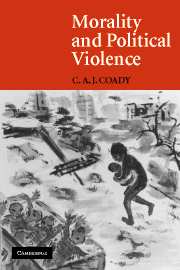Book contents
- Frontmatter
- Contents
- Preface
- Morality and Political Violence
- 1 Staring at Armageddon
- 2 The Idea of Violence
- 3 Violence and Justice
- 4 Aggression, Defence, and Just Cause
- 5 Justice with Prudence
- 6 The Right Way to Fight
- 7 The Problem of Collateral Damage
- 8 The Morality of Terrorism
- 9 The Immunities of Combatants
- 10 Morality and the Mercenary Warrior
- 11 Objecting Morally
- 12 Weapons of Mass Destruction
- 13 The Ideal of Peace
- 14 The Issue of Stringency
- Bibliography
- Index
8 - The Morality of Terrorism
Published online by Cambridge University Press: 05 June 2012
- Frontmatter
- Contents
- Preface
- Morality and Political Violence
- 1 Staring at Armageddon
- 2 The Idea of Violence
- 3 Violence and Justice
- 4 Aggression, Defence, and Just Cause
- 5 Justice with Prudence
- 6 The Right Way to Fight
- 7 The Problem of Collateral Damage
- 8 The Morality of Terrorism
- 9 The Immunities of Combatants
- 10 Morality and the Mercenary Warrior
- 11 Objecting Morally
- 12 Weapons of Mass Destruction
- 13 The Ideal of Peace
- 14 The Issue of Stringency
- Bibliography
- Index
Summary
Throwing a bomb is bad,
Dropping a bomb is good;
Terror, no need to add,
Depends on who's wearing the hood.
Roger WoddisTerrorism intrigues and disturbs policy makers, the media, and the public even more in the infancy of the new millennium than it did in the last quarter of the twentieth century. And although this fact no doubt delights terrorists themselves, and consoles them for the apparent ineffectiveness of much terrorist activity in achieving ultimate political goals, it is nonetheless surprising that the phenomenon has commanded such attention. Prior to September 11, 2001, the death and damage done by what are commonly called terrorist attacks in any single year had been mostly insignificant compared to the annual road toll in the United States, or to the “collateral” death and damage caused by the NATO bombing of Serbia in just one month of 1999. Even the September 11 attacks were small-scale compared to the destruction wrought by other dramatic attacks, such the bombing of Dresden and the atomic destruction of Hiroshima and Nagasaki in World War II. These might well qualify themselves as terrorist acts, and indeed I shall argue that they should, but most of the contemporary anxiety about terrorism is focused on the activities of substate agents whose successes have been nowhere as spectacular. The explanation of what can seem a disproportionate concern with substate terrorism is sometimes said to lie in the random and unexpected nature of the attacks, but this cannot be the whole story, since most road deaths are, if anything, even more random and unexpected, though of course they are not usually “attacks.”
- Type
- Chapter
- Information
- Morality and Political Violence , pp. 154 - 178Publisher: Cambridge University PressPrint publication year: 2007



